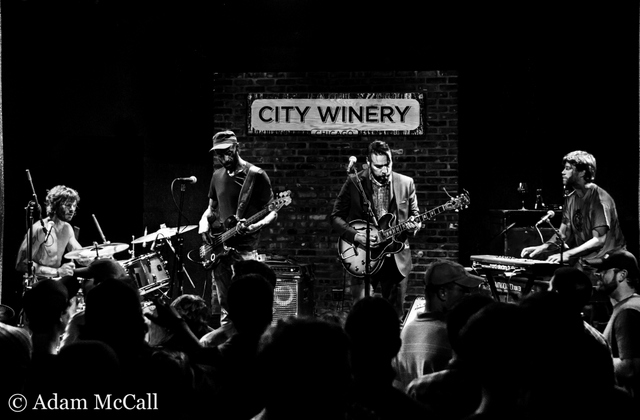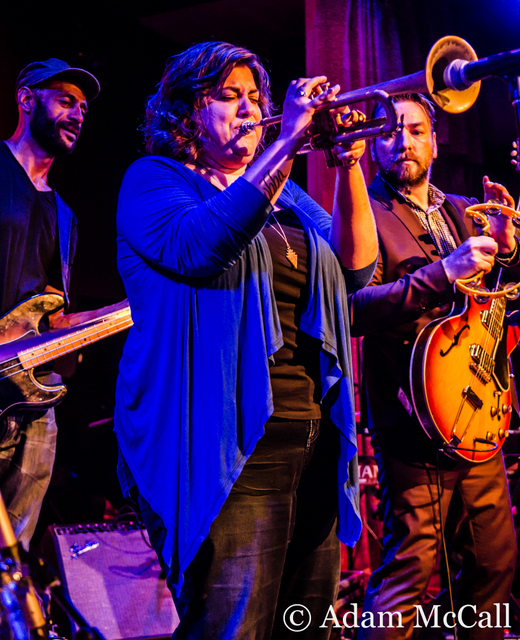Submitted By: @312mrg
Photos: Adam McCall Photography
The internal excitement hit me like a heat wave in the midst of the polar vortex-ed Chicago winter. When the New Mastersounds announced a return appearance at Chicago's House of Blues on June 7th in February, it stoked the flame and was promptly marked on the calendar. Consider this your prodding to ticket yourself for the band's “Celebrating 10 years in the USA” event presented by SilverWrapper.
I've been a fan for a number of years, but finally caught them live at last year's Taste of Randolph Festival, and their accompanying late night at City Winery.
My insatiable funk appetite was temporarily salved by a band that has no equal, but I’ve patiently awaited another opportunity to take in the party. That night is now just a few days away, and anticipation mounting amongst Chicago-area funk lovers for a 2-set sweat fest. A pure NMS onslaught awaits.
I was fortunate to catch up with Simon Allen (drummer) and Eddie Roberts (guitar) in advance of this weekend's gig. They had a lot to say about the naming of their instrumental tunes, collaborations and superjams, the inclusion of horns and having space to breath.
It is astonishing a group with so little time to rehearse can lock in as tight as they do in such short time. You’ll discover the entire jam and funk scene owes a bit of gratitude to Chicago’s own entrepreneur David Vandenburg for bringing this outfit to the States (and the House of Blues) 10 years ago. Be a part of the celebration on Saturday and prepare for recovery on Sunday.
The Barn: I watched an interview where you explained the naming of "Thermal Bad" (German translation meaning bath) for this forbidden swimming pool at the hotel you were staying at. Naming instrumentals seems to be an ambiguous and cheeky exercise for the band. While some are more obvious like, "MRG" for Mark's Red Guitar, can you elaborate on "Old Man Noises"?
Simon: "Old Man Noise"s refers to the groaning / creaking / wheezing sounds we’ve all started to emit involuntarily when doing something arduous like sitting down or standing up. Pete came up with this tune, and since, at 53, he’s the oldest man in the band, this seemed an appropriate title. It’s also laced with hubristic irony since the frenetic groove sounds (to me at least) unlike anything a bunch of old men ought to be capable of delivering.
And Is "Monday Meters" a tribute to your NOLA brethren?
Simon: In a way, yes. They were one of our biggest influences in the beginning and almost every NMS album has a track that kind of sounds like it could be a Meters tune (e.g. "Miracles", "This Ain’t Work", "The Vandenburg Suite", "102%", "Hole in the Bag", "Soulshine", "You Mess Me Up") - with a catchy scratchy guitar motif, and screeching Hammond. "Monday Meter"s got the name because at the end of every day of pre-production in Leeds (where some of the album was written) the engineer gave us a folder of rough audio. This one was in the “Monday” folder, and it’s the most obviously Meters-y tune.
Are the names of your songs specific to the time they are created with a randomness to them, or is there a more creative process that goes into stamping a label on the package that is a NMS song?
Simon: Eddie usually has a genuine emotional explanation for the names of his tunes, and invites the rest of us to name ours (not that I ever write any tunes myself, but I tend to help Pete and Joe come up with names for theirs).
I am really intrigued with the decision to add the U.S. as a destination to your album and tour cycle 10 years ago. As a lot of new discoverers may not actually realize you are from Leeds, UK. Who brought the concept to the band and was it initially accepted?
Simon: A philanthropic music-lover called Dave Vandenburg sent me an email out of the blue back in 2004, enquiring if we would be interested in playing in Chicago. (This was only a short while after I had set up a website via which the band could be contacted.) I didn’t initially understand that he was offering not only to bankroll the trip, but also to arrange the gigs, and thought he must be some kind of crank.
I didn’t even mention it to the other guys until he sent me a link to the airline booking as I didn’t want to give them false hopes. Times were hard for us back then and it wasn’t clear that the band had any kind of future.
DV not only paid our airfare and put us up in his lovely house, he also got us an opening slot on the Greyboy Allstars gigs at the House of Blues. And this was a band who didn’t need (or particularly want) an opener – they were filling the place all by themselves and playing 2 long sets per night – so he must have had some impressive powers of persuasion.
The next really important thing he did for the band was to get us an unpaid slot at High Sierra Music Festival the following year (not to mention bankrolling and tour-managing that trip too). The gigs we played there went down so well with the Bay Area hippie crowd that we suddenly had a loyal following, and as a result we got some interest from a few booking agents. The rest is history…

Where are the full time residences of Eddie, Simon, Pete and Joe?
Simon: Eddie currently lives in New Orleans, Simon and Joe both live in Leeds (where the band formed in 1999), Pete lives in Menorca (one of the 3 Balearic islands 100 miles off the coast of Spain).
How does that distance stint, aid or add freshness to the chemistry of rehearsals, touring, recording or just getting creative ideas to and from one another? How heavily do you rely on technology?
Simon: Rehearsals? I wish! Brand new creative ideas are usually exchanged during the process of making each album (we make a new record on average every 18 months), and for that we have to find a way to get us all in the same room in the same city for a few days at a time, which is quite a challenge these days.
When there’s a long hiatus between live gigs (as there was this year between January and April) there’s always a tension on the first show between sloppiness and freshness. On the one hand, we’re a bit out of shape and it takes a while to tune into each others’ respective wavelengths, so things can get a little scrappy; on the other hand there’s a real appetite that has built up that generates a passionate performance, and the rough edges have their own appeal.
How would you characterize the differences between your UK and US crowds and shows?
Eddie: These days the UK audiences are as passionate as any in the US, though we only play in UK a couple of times a year, in Leeds and London.
Do the UK audiences tape performances? I haven't seen a show circulate or surface from say a Ronnie Scott’s show or the recent opening of the London Brooklyn Bowl.
Simon: Apart from the occasional enthusiastic sound engineer, nobody records gigs in the UK. The concept is totally alien to audiences, and in most venues it would be prohibited by default anyway.
We played an amazing show with Lou Donaldson to 900 people in Cornwall in 2004. It was the last of a run of three shows and we had reached a point where the chemistry between Lou and the band was incredible. At the end of the gig I was buzzing and I asked the sound engineer if he had recorded it. He said: “No, but I could have done if you had mentioned it before the gig and you had given me a blank CDR.” Oops.
Mind you, at least I know that my memory of the gig can never be tainted by the harsh reality of a digital recording. And in my opinion funk recordings need to be produced right: it’s not often that a soundboard mix or an audience recording actually sounds any good, even if the gig sounded great in the room on the night.
Live funk recordings really need to be multi-tracked and mixed afterwards to get the bass and the drums balanced and delivering the right frequencies. And, dare I say it, the performances sometimes need to be edited if they are to be listened to in the cold light of day. We know this is heretical talk in the post-Grateful-Dead scene that we’ve inherited, so we have always allowed recordings even if we don’t choose to listen to them ourselves.
Chicago obviously has some sentimental value, and New York is a frequent draw and supports you extremely well. What are your favorite venues or cities to play in the States?
Simon: Apart from Chicago and NYC there’s Denver (Cervantes), New Orleans (Blue Nile, House of Blues) and San Francisco (Boom Boom Room, Independent).

Simon: We did have a full-time sax player (fellow Brit Rob Lavers) touring with us in the US for a year and a half, around 2007-2008. On the bigger gigs in the past couple of years we’ve had the pleasure of the West Coast Horns (who guested on our 2012 album “Out on the Faultline”) and it’s always a special treat to have them: Mike and Joe are amazing players and have their own chemistry as a section.
Having horns opens up a whole different repertoire of tunes for us to play, which is great when we’ve been playing without them for a run of shows and we’re starting to become over-familiar with our own material. But a big part of what makes NMS stand out as a funk band is the raw core 4-piece sound: there’s space in the music, and funk is all about the gaps – it’s as much about what you don’t play as what you do. Plus, the more people there are on stage, the harder it is for Eddie to communicate with everyone at lightning speed. We can deliver more spontaneous jams when it’s just the four of us.
How do you maintain connections with the breadth of artists you have shared the stage with? Like Jennifer Hartswick appearing with you in Chicago at the City Winery show?
Simon: When I’m at home I like to stay in touch with Jennifer and other musical collaborators via Twitter and Instagram. Eddie has been gigging quite a bit without us in the US this year (including touring with the Everyone Orchestra) so he stays tight with fellow players on the scene.
How do Superjams seem to develop? They could go off the rails if someone doesn't somewhat take the lead in song selection, guest selection, etc?
Simon: Eddie is the ultimate bandleader - he has excellent musical taste and judgement – he’s like an on-stage DJ, but he’s controlling fellow musicians instead of mixing records.
If Eddie is the optimist, Simon is the pessimist, what are Joe and Pete?
Simon: Pete is the skilled diplomat and will always tell you what you want to hear. Joe wears earplugs and sticks a blanket over his head so he doesn’t have to listen to anyone else’s tedious nonsense.